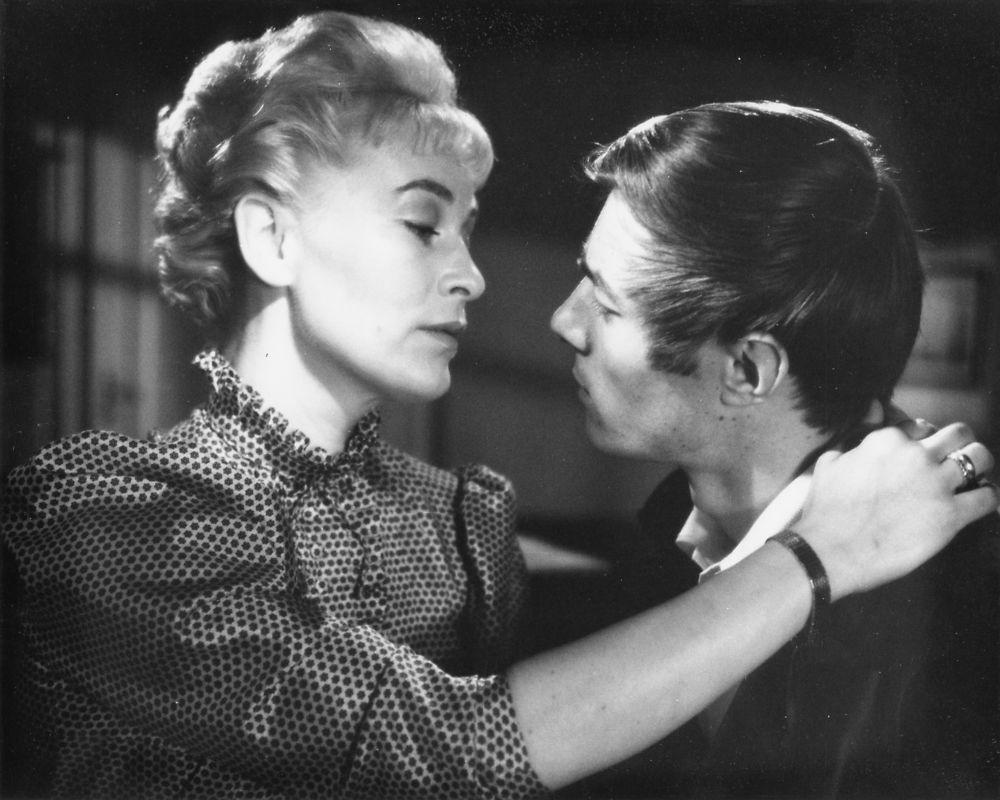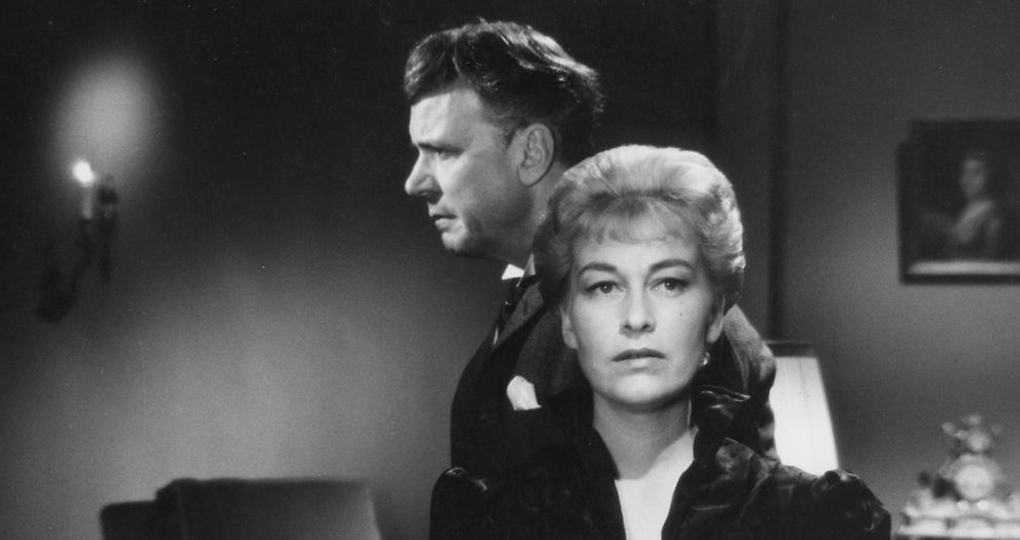
Gertrud. The name alone is… strange. For me the name will forever be linked to the German mother of a childhood friend, the perfect white tornado of a housewife, whose toilet was always blindingly clean and accoutred with a pink plush toilet-seat cover and drip rug. Still, she was nowhere as strange as Dreyer’s Gertrud. Moreover, considering how utterly, incredibly boring and fussily slow the film is, it’s astounding to consider how profoundly it rattled the middle classes. Gertrud not only engendered a flurry of deeply touching letters to Dreyer from grateful women who felt they had finally been touched deep in their souls. The film also triggered an avalanche of reviews and opinions in the press, holding it up like an icon or beating it like a misbehaving kid in the schoolyard. Dreyer’s film neatly divided the audience. The question now, in 2010, is whether we still "have any use it for," as we like to say.
Come on, sister Gertrud!
One dark winter evening my sister and I ensconced ourselves on the sofa in front of Gertrud, following the black and white drama on the screen. At first, our laughter was never far away, for what on earth was this? Did they really have to speak so artificially and be so disengaged all the time? Why was she so unapproachable? "Come on, sister Gertrud – do something!" I found myself yelling more than once. An hour or so into the film I had to get some panic snacks from the kitchen to keep us from falling asleep. When Nina Pens, as Gertrud, in old-lady makeup, in the end ejected the last remaining suitor from her home, we drew a sigh of relief, "Finally!"
But the movie lingered. A wonderful thing had happened. It had actually struck something deep inside of me, something that irked and itched, nagged at me and wouldn’t let me be. A modern person in a knowledge society, I am so used to understanding that not understanding was so suitably new and strange to me that I had to keep returning to it. Gertrud can be understood, but, I found, maybe it really needs to be sensed. Aesthetically as well as intellectually.
Scandalous Gertrud
Personally, I’m not savvy about the cinematic side of the work, but as a woman and a sociologist it is clear to me why Gertrud was so cathartic and caused such a stir. She premiered in 1964 and 1965 and caused tremendous commotion, scandal even, in Paris at her world premiere. One reason, naturally, was the challenging cinematic style, described at the time as "terribly heavy and almost insufferably pathetic," but the film precisely through it creates the atmosphere that Dreyer wanted to leave us with for the sake of identification. A few critics got it at the first screening. One was Bent Grasten of Ekstra Bladet, who wrote,
"The slowness isn’t realistic because it shows what we see; it is realistic because it shows what is in the mind, the soul, the senses and the emotions. For that reason, too, 'Gertrud' is an insatiably thrilling film, if you immediately go for the inner realism."
That’s what you end up doing. This Gertrud, who wants love as unconditionally as a child does, ends up forsaking love entirely to keep it intact. No man proves to be a worthy bearer of her expectations. Hubris, some would call it. Others would call it liberation.
Amor omnia
Gertrud is so much a woman that her conviction is "amor omnia" – love is all – what women archetypically are connected to, the world of the emotions, above all. That’s why she leaves the man in her life when she finds a slip of paper upon which he has written, "Woman’s love and man’s work – the two are enemies from the beginning." She insists on being the only thing, not just the only one, for the man to whom she devotes all her love. That’s why she leaves both her men, for neither of them can live up to that ideal. That’s why the young lout abandons her. He is the only one who understands how vast her love is, fleeing in horror at its all-devouring nature.
Gertrud in 2010?
Does this film have anything to say to women today? When I look at the number of divorces (many more than half of which are initiated by women), when I look at the number of adulterous wives (reportedly, slightly more than half of all women who are in relationships) and when I read the classified ads on various websites, there is do doubt in my mind. Gertrud does have something to say to us, for what is a dream for her is still a dream for her descendants. Time and again I meet women who tell me the most compelling success stories about their professional and social lives, but who never really consider their lives to be successful, because their story always ends with a trembling, …But am I loved?
Apparently, it’s still a given that a woman has not attained her innermost and highest purpose until she is loved. Only, it’s less obvious now than it used to be, because today we have a different independent financial freedom to wrap that longing for all-powerful love in, hence it increasingly manifests itself as serial monogamy, as a way to keep love’s flame intact. Love’s. Not love of a specific person. Our relationship is with love. The man is a means, pure and simple. At least that’s how it looks to Gertrud’s daughters in spirit.
Men as stages in a woman’s development
What was so unheard-of and modern back then, when women in earnest were starting to demand their liberation, was that Gertrud used men as stages in her own development. That must have seemed terribly provocative to men at a time when woman’s most important job in life was to choose the right provider for her family in order to enter the coveted social route to acceptable and secure middle-class life. That this at times did not leave room for the woman’s own needs and her heart’s desires was less important. Then again, no one probably ever cocked a razored chin at the fact that men readily used women in the exact same role: as catalyst for the man’s development. Perhaps because man was always the "first sex," and thus the undefined sex, while woman was always the "other sex" and thus had to be defined in relation to the male sex, the starting point for all (the right things). That privilege is dangling in the breeze now, too. Growing numbers of men’s studies scholars are materialising these days, demanding that we now start dealing with the male sex and define it in a modern context. And a good thing, too, for it is only when both genders have freed themselves from constricting social and cultural forms and content that we can all be free to be people first and genders second.
Leaving men out
When Gertrud finally chooses to leave men entirely out of her life, the film shows itself to be not only exceptionally provocative but also exceptionally farsighted. An increasing number of single women today are inseminated and raise a child on their own without the hassle of dealing with a father who wants to have his say. Another increasingly common family pattern is couples choosing to "live apart together," keeping two homes, or divorced women choosing never again to commit to a family-based relationship, preferring to live their lives with a boyfriend on the side.
The not so farsighted Dreyer
Dreyer was less farsighted when it comes to women having careers. Today, women are increasingly being promoted ahead of men and obtaining more college degrees. At the same time, women in the top income bracket have the hardest time finding a spouse, because men traditionally do not marry up but down in the social hierarchy. So, we are now faced with a situation where Gertrud might say: Man’s love and woman’s career – the two are enemies from the beginning.

Woman’s nature
On the surface of things, woman’s "nature," which was much debated in the papers at the time, hasn’t changed. She still seeks love as the most important thing, the place that redeems her raison d’etre, which gives her the experience of coming "home." Hence the line, …But am I loved? Beneath the surface, however, a new social pattern is emerging, where women increasingly seek to live out their highest purpose through children and a career – and where the man can be replaced, influenced by Gertrud’s example, when he doesn’t live up to her expectations for a relationship in love.
A perfect woman’s life
Perhaps Gertrud is simply a precursor of the type of woman who celebrates the so-called perfect life, an idea that has haunted us way too long. All those thousand-shades-of-cream homes and EIKs, self-realisation careers, organic baked goods and bedding, cute-sassy kids – and a trophy husband to have swinging-from-the-chandelier sex with every Saturday – essentially give all women nervous tics and grievous self-esteem issues. Still, there are some women – especially well-publicised women of the so-called creative class – who continually appear in the media to show us how such a life is attainable. How women ended up signing up for the impossible dream is still a mystery to me, because I can’t see what good it will do us. No one can be perfect after all. Not women and not the men we choose to share our lives with. Chasing perfection is chasing your own constant and perpetual unhappiness.
Perhaps that’s why Gertrud is only happy at the end, when, a self-imposed hermit, she chooses freedom over love. "I have suffered much and I have often been wrong – but I have loved" goes one of her last lines. Thus, we note, only when she is safely lying under her tombstone, inscribed "Amor Omnia," can she be happy, because there is no longer any risk of life and men getting in the way of her dream of perfect love.
Unconditional love?
Poor Gertrud. And pity all the modern women who opt for flashy barbeque grills, throw-pillow kids and hefty business cards and opt out of a pain-in-the-ass husband who sometimes would rather scratch his crotch, burp loudly and watch football than submit to his wife’s unconditional love. For it is not unconditional. And neither was Gertrud’s. Indeed, she ended up choosing love itself rather than its object.
Uncompromising Gertrud
The Gertrud of my childhood did not live as uncompromisingly as Dreyer’s Gertrud did, even though she too ended up without a man. Today she is a widow frequently visited by her daughters and grandchildren. A professor’s wife and a mother, she too realised a traditional woman’s life, starting off in the period that Dreyer’s Gertrud is from. Her life’s model is of no use to most women today. Nor do we have any use for Dreyer’s Gertrud. For that she is too dreamy, unrealistic and one-sided to serve as a source of inspiration for a woman’s life today, which has so many parameters other than just love for a man. While Gertrud needed a man’s love to confirm the meaning of her life, a woman today can fulfil the purpose of her life by providing a different answer to the question, "…But am I loved?" For a woman today it’s mainly about loving herself – to be able to realise herself and make her original contribution to the world, but, equally, also to be able to love others. Therein – not in man – lies true liberation from restrictive social norms and structures. Perhaps that’s exactly what Gertrud realised at the end.
By Emilia van Hauen | 03. July 2010
